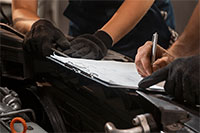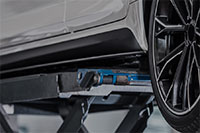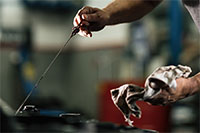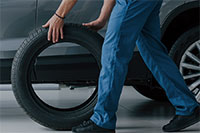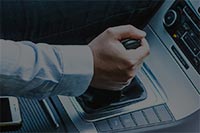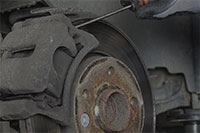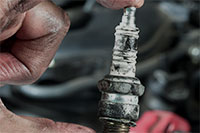Brake Repair and Maintenance
A Comprehensive Guide
A well-maintained brake system is the cornerstone of automotive safety. Unfortunately, many vehicle owners overlook the health of their brakes, leading to safety risks and costly repairs. But what if, with the right knowledge, you could maximize your vehicle's safety and save money on unforeseen repairs? About 20–25% of crashes every year in which vehicle failure was cited were brake-related. In this article, we will talk about common brake issues.
Let's dive in.
- Worn Brake Pads
- Brake Fluid Leak
- Warped Brake Rotors
- Sticking Brake Calliper
- Brake System Flush
- Brake Pad Replacement
- Brake System Overhaul
- ABS (Anti-lock Brake System) Repair
- Brake Line Replacement
- Brake Booster Replacement
- Parking Brake Adjustment or Repair
Worn Brake Pads
Your vehicle's brake pads might be small, but their contribution to safety is immense. These friction buffers handle the brunt of slowing your vehicle, gradually wearing away each time you press the brake pedal. Once worn down, they can't provide the necessary friction, reducing braking efficiency and endangering road safety. But it's not just about safety; worn pads can also grind against the brake disc, damaging it over time and leading to costly rotor replacements. Regular pad inspections can help you catch this problem early, maintaining optimal braking performance and saving you from expensive repairs.
Brake Fluid Leak
Brake fluid is the unsung hero of your braking system, transferring the force from your foot on the pedal to the actual brakes. However, any leaks in this crucial hydraulic system can lead to diminished braking power, making it harder to stop your vehicle and posing a significant safety risk. Unlike other issues, brake fluid leaks aren't always obvious and can sneak up on an unaware driver. Regular checks of the brake fluid reservoir and being attentive to a spongy brake pedal can help detect leaks early, preventing catastrophic brake failure.
Warped Brake Rotors
Brake rotors may seem like indestructible metal discs, but they're susceptible to warping under extreme heat and stress. Warped rotors result in inconsistent contact with the brake pads, causing annoying vibrations and significantly reducing braking efficiency. They can also wear brake pads unevenly, leading to premature replacement. Regular rotor inspections, especially after intense driving sessions like a long road trip, can help identify any warping early on. Resurfacing or replacing warped rotors ensures consistent braking performance and extends the life of your brake pads.
Sticking Brake Caliper
Brake calipers, often overlooked, are instrumental in your vehicle's braking system. They apply the force necessary to clamp the brake pads onto the rotors, but a caliper that sticks can cause the pads to remain partially engaged. This not only generates excessive heat, wearing down the pads and rotors, but also creates a pulling sensation while braking. Regular lubrication of the caliper slide pins and replacing any damaged dust boots can keep your calipers moving freely, ensuring balanced braking and reducing the wear and tear on your brake components.
Brake Line Damage
Nestled amidst the underbelly of your vehicle, brake lines are often overlooked but are integral to brake system operation. These tubes carry brake fluid from the master cylinder to each wheel's brakes. However, they are vulnerable to rust and corrosion, leading to leaks and compromised braking efficiency. Regular inspections can help identify any signs of corrosion or physical damage. Addressing brake line issues promptly can prevent unexpected brake failure, ensuring the safety and reliability of your vehicle.
Malfunctioning Master Cylinder
The master cylinder, a key component of the brake hydraulic system, controls the fluid pressure that allows your brakes to engage. When it malfunctions, you might experience a sinking brake pedal or uneven braking. Because it’s integral to your vehicle’s brake system, a faulty master cylinder can endanger your vehicle's overall safety. Regular checks and maintaining an optimal brake fluid level can help diagnose a failing master cylinder, helping you steer clear of brake failure.
Worn Brake Discs
Brake discs, the unsung workhorses of your braking system, take a beating every time you step on the brake pedal. They experience intense heat and friction, leading to wear and tear over time. Worn discs can decrease your vehicle's stopping power, leading to longer stopping distances and reduced safety. Regular inspection and timely replacement of your brake discs can ensure consistent, efficient braking, contributing to your vehicle's overall performance and safety.
Inadequate Brake Cooling
Brake cooling is crucial for the overall health of your brake system. Under heavy use, brakes generate immense heat, and without proper cooling, this heat can degrade brake components. Adequate cooling prevents warping of the brake rotors and excessive wear on the brake pads. Keeping an eye on your brake cooling system, especially if you do a lot of heavy braking, can help prevent heat-related brake issues, ensuring your brake system's longevity and performance.
Failed Brake Booster
A brake booster multiplies the force from your foot, making it easier to stop your vehicle. If it fails, you may find your brake pedal is hard to press or your car takes longer to stop. These issues pose significant safety risks, especially in emergency stop situations. Regular maintenance checks and being attentive to changes in your braking performance can help detect a failing brake booster, enhancing your vehicle's safety and braking efficiency.
ABS Issues
Your vehicle's Anti-lock Braking System (ABS) prevents the wheels from locking up during an emergency stop, allowing you to steer while braking. Any issues with the ABS can compromise your vehicle's handling in critical situations. Regularly monitoring your ABS light and seeking professional assistance if it stays on can help address any potential ABS issues, ensuring safer and more controlled braking.
Damaged Brake Shoes
Brake shoes are crucial components in drum brake systems, pressing against the drum to slow your vehicle. Over time, these shoes can wear down or get damaged, reducing their efficiency and causing your brakes to squeal or grind. Regular brake shoe inspections and replacements ensure effective stopping power and prevent damage to the brake drums, enhancing your vehicle's safety and longevity.
Thank you for reading this article on brake repair and maintenance.
If you reside in Vernon or nearby communities and are in need of professional brake repair and maintenance services, we invite you to schedule an appointment with us. Be safe.



